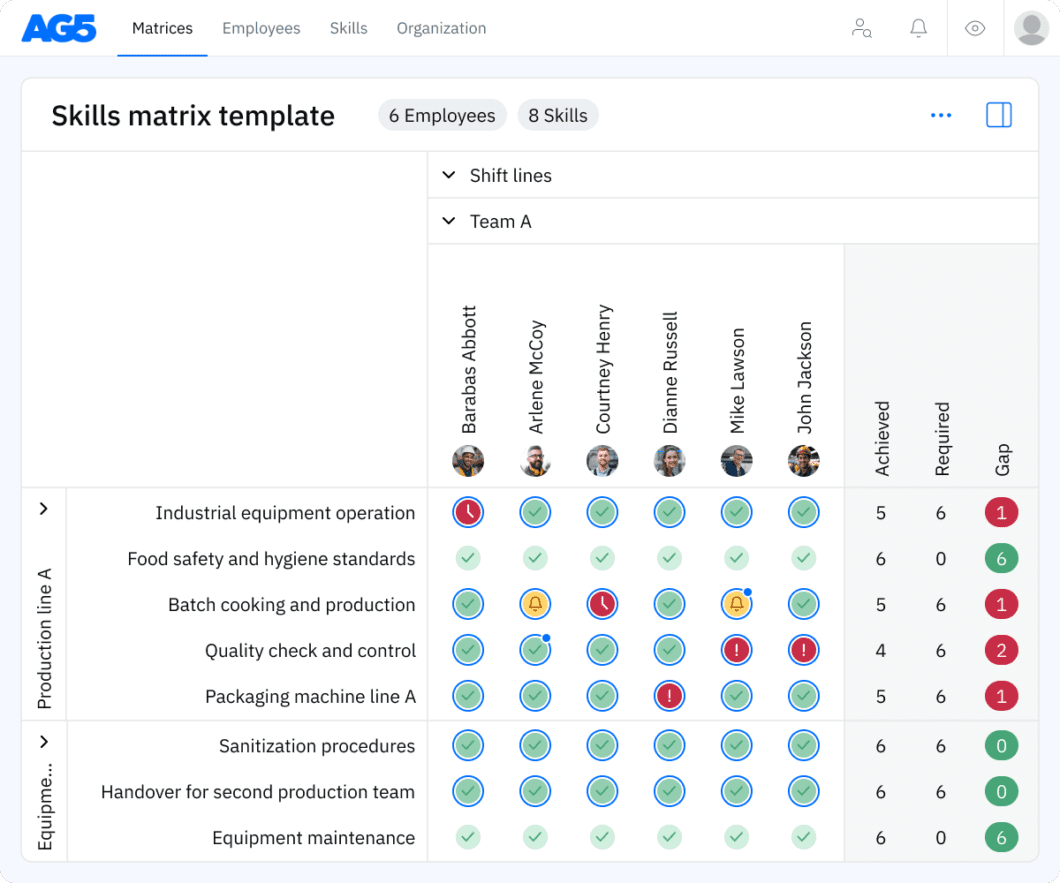Oil and gas industry skills matrix template
A skills matrix template is a tool that can be used in the oil and gas industry to effectively manage and assess the skills and knowledge of individual employees or teams.
Download your free template here

Overview Copied
With our free oil and gas industry skills matrix template, you will receive a clear overview of the skills that are present in your organization, as well as those that are missing. Using this information, you can develop and implement a plan to ensure that your employees’ skills are up to date, comprehensive, compliant, and ready for the future.
Health, safety, and environment (HSE)
- Knowledge of HSE regulations and standards (e.g., OSHA, EPA)
- Hazard identification and risk assessment
- Incident investigation and reporting
- Emergency response planning
- Safety management systems (e.g., ISM, OHSAS 18001)
- Environmental management (e.g., ISO 14001)
- Personal protective equipment (PPE) usage
Technical operations
- Drilling operations
- Well completion techniques
- Production optimization
- Reservoir management
- Pipeline operations and maintenance
- Offshore operations
- Process safety management
Engineering and maintenance
- Equipment maintenance and reliability
- Mechanical integrity and inspection
- Electrical and instrumentation maintenance
- Rotating equipment management
- Corrosion prevention and control
- Asset integrity management
Regulatory compliance
- Compliance with local and international regulations (e.g., API, ISO)
- Permitting and reporting requirements
- Audits and inspections (internal and external)
- Understanding of industry codes and standards
- Risk management and compliance assurance
Project management
- Project planning and scheduling
- Cost estimation and control
- Contract management
- Stakeholder management
- Risk management in projects
- Quality assurance and control
Supply chain and logistics
- Procurement and contract management
- Inventory management
- Logistics and transportation planning
- Vendor management
- Supply chain optimization
Data management and technology
- Data management and analysis
- SCADA systems and automation technology
- Cybersecurity in oil and gas operations
- Predictive maintenance technologies
- Digital oilfield technologies
- Geographical information systems (GIS)
Human resources and training
- Workforce training and development
- Competency assessment
- Succession planning
- Employee health and wellness programs
- Labor relations and contract management
Benefits Copied
Skills management software is crucial for talent retention, development, compliance, operational efficiency, and succession planning in the energy industry, where highly specialized positions are often challenging to fill or replace.
Download the free Excel Oil and gas industry skills matrix template Copied
We also have a free Excel template available that you can download if you are not ready to get started with AG5. To download it, please complete this form here.
Author Copied
Revisions Copied
Tired of managing skills in Excel?
Say goodbye to Excel matrices. Start using AG5’s plug and play skill matrix software.
Recognized by G2 for Excellence in Skills Management

